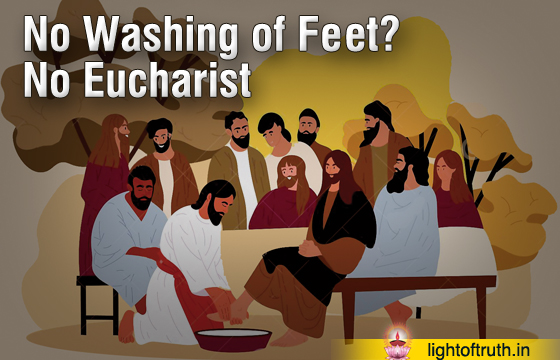Azadi ka Amrit Mahotsav Kolkata event honours four Clergymen
Pope Francis asks businesses to support working women: They’re ‘afraid to get pregnant’
Study: Christianity may lose majority, plurality status in U.S. by 2070
Indian politician declines Magsaysay Award under party pressure
Like John Paul II, Pope Francis heads to Kazakhstan during time of war

Shaji Karimplanil Capuchin
 As it is quite evident, there are any number of divergences among the Gospels. For e.g., the Christmas stories we read in Matthew and Luke are missing in Mark and John. Even as Matthew and Luke narrate Jesus’ birth account, they differ significantly in many details. The timeless parables like the Good Samaritan and the Prodigal Son are seen only in Luke. Cleansing of the Temple, according to the Synoptics, took place towards the end of Jesus’ public life, while according to John, it is almost at the very beginning of His public life. Crucifixion, for John, is on Maundy Thursday, and not on Good Friday!
As it is quite evident, there are any number of divergences among the Gospels. For e.g., the Christmas stories we read in Matthew and Luke are missing in Mark and John. Even as Matthew and Luke narrate Jesus’ birth account, they differ significantly in many details. The timeless parables like the Good Samaritan and the Prodigal Son are seen only in Luke. Cleansing of the Temple, according to the Synoptics, took place towards the end of Jesus’ public life, while according to John, it is almost at the very beginning of His public life. Crucifixion, for John, is on Maundy Thursday, and not on Good Friday!
Although these are certainly irreconcilable differences, these are still quite explainable. Mark, the first Gospel, was written in the 60s, Matthew and Luke in the 70s, and John in the 90s. So there is some thirty years’ gap between the death and resurrection of Jesus and the writing of the first Gospel. Hence these differences are bound to occur.
For e.g., how many of us can remember exactly what our English teacher taught us in the 10th class? Or on which date our school came first in the Youth Festival held at the district level? If you ask some five classmates, all the five answers would be quite dissimilar. We tend to forget what we heard, or the date on which something occurred. Then, no wonder, the Gospels must differ among themselves, as there was over a three decades’ gap between the Jesus event and the Gospel accounts.
Returning to the imagery of the 10th class, imagine that your English teacher suffered a cardiac arrest one day as she was giving class. As it is quite an unusual event, even after fifty years you are going to remember it vividly. Something comparable is there in the institution of the Eucharist. Just as the teacher suffering a cardiac arrest is not an everyday happening, so is the institution of the Eucharist. The institution took place right in the previous night of Jesus’ brutal murder. The mood during the Last Supper was quite sombre. Death was looming large. Despair and fear were thick in the air. The Disciples were almost sure that their Master was going to be executed. All their dreams and hopes were about to be dashed. And the Last Supper was going to be really the last, they knew it for sure. Usually, Jesus taught the disciples while there were many around. The crowd was almost always with Him. But the Last Supper had to be different, as He was going to give the Disciples the last message. They should not at any cost miss it. So He called only them; no crowd, no noise, no distraction. And then we know what took place: the institution of the Eucharist.
Now, if John was present there during the Last Supper, how could he afford not to mention it in his Gospel? The Institution was not an everyday affair. It was almost the Lord’s parting message. If John was the beloved disciple, who was reclining next to the Lord (cf. John 13:23), his silence with regard to the Institution is quite bewildering, to say the least. It is like you forgetting the English teacher suffering a cardiac arrest. Such forgetfulness is extremely unlikely; and yet that is exactly what happens from John’s part. So, we are compelled to say John’s omission of the Institution is deliberate. If it is so, why did he choose to do it?
A reasonable explanation given by some scholars runs like this: Soon after the death and resurrection of the Lord, what came into practice among the First Christians was the breaking of the Bread in the Lord’s memory. However, what happened was what is happening today: the Eucharistic rubrics was meticulously observed, but not its spirit; liturgical prayers were on, but its spirit dwindled. One typical evidence we have is in 1 Corinthians. As we know this letter was written in the 50s, almost a decade before the first Gospel. The problem associated with Eucharistic celebration finds a mention in 1 Corinthians 11. There Paul chides the Corinthian community saying that what they are doing is not the Eucharistic celebration of the Lord. The reason had nothing to with the observance of liturgical rules, but everything to do with their life. They had division in the community, and when such a community breaks the bread, it cannot be regarded as the Eucharistic celebration, but just a gathering for eating and drinking. In the Corinthian community breaking of the bread was taking place, but not the breaking of the ego; imitation of Jesus’s actions was very much on display, but not His life.
![]()
“The importance the Synoptists accord to Eucharist is the importance John accords to the washing of the feet. Stated otherwise, the spirit of Eucharist is the willingness to wash another’s feet.”
![]()
It is in such a context John is writing his Gospel, one of the last writings in the New Testament corpus. True, there are scattered references, like “I am the bread of life” (John 6:35), about Eucharist in his Gospel. But about the institution of the Eucharist per se, not even a passing reference. In the place of the Institution, narrated by the Synoptists, John gives the account of Jesus washing the feet of His Disciples. If we had only John’s Gospel, we would get the impression that at the Last Supper Jesus did only the washing of the feet! The importance the Synoptists accord to Eucharist is the importance John accords to the washing of the feet. Stated otherwise, the spirit of Eucharist is the willingness to wash another’s feet.
After offering the bread and the wine as His body and blood, Jesus commands them to “do this in remembrance of me” (1 Corinthians 11:25). In Johannine Gospel, after washing Disciples’ feet, Jesus commands them, “I have set you an example, that you also ought to do as I have done to you” (John 13:15). Just as we participate in the Eucharistic celebration, so also we should participate in His washing of the feet. “If I, your Lord and Teacher, have washed your feet, you also ought to wash one another’s feet” (John 13:14). Hence this is an uncompromising demand form the Lord. From all these it will not be an exaggeration to say that inasmuch as Eucharist is the centre of Christian life, washing the feet is also the centre of Christian life. Wherever an attitude of one-upmanship or an attempt to belittle others or authoritarianism is present, there can be no meaningful celebration of the Eucharist.
This is very much reflected in the very first prayer in Syro-Malabar liturgy: “Let us be reconciled and united as we are about to begin the Holy Mass…” And this reconciliation and unity can be achieved only if the Church members really and concretely follow the Lord who left us no example other than washing one another’s feet.
In the passage about the Good Shepherd, we hear the echo of the act Jesus did at the Last Supper. “I am the good shepherd, who lays down his life for the sheep” (John 10: 11). Jesus regards His life as expendable in the service of the sheep. The sheep is not for the shepherd, but rather it is just the other way. In fact, John presents the ultimate sacrifice on the cross as the consequence of the various positions Jesus took for the sake of the sheep. Let us consider three miracles: the healing at Bethsaida (John 5), the healing of the blind (John 9), and raising of Lazarus (John 11). The aftermath of the first miracle is seen in John 5:18: “For this reason the Jews were seeking all the more to kill him….” After the second miracle opposition to Jesus grows fiercer, with the casting out of the blind from his community. After raising Lazarus enmity towards Jesus reaches a crescendo, with John narrating the plot to do away with Him in John 11:45-57. Every step Jesus took for the sheep was a step towards the cross. This laying down of the shepherd’s life in the service of the sheep is dramatized in the act of washing the feet.
In John 13, where we read about the washing of the feet, we have Jesus’ another command that runs parallel to what we read in verses 14-15: “Just as I have loved you, you also ought to love one another” (John 13:34). This verse is complemented by 1 John 2:6: “Anyone who abides in Jesus, ought to walk just as He walked.” John puts the same thing differently in John 20:21, “As the Father has sent me, so I send you.” So Christian life, much more than a new way of worship, is a new way of life. The means and the style of Jesus have to be that of the disciples of all times as well.
It was when James and John vied for the first seats in the Kingdom to come, Jesus gave the Disciples the first lesson on authority: bossing over others is the pattern of the world at large, but among them it is a whole new ball game, where the first seeks the last slot (cf. Mark. 10:42-45). He minces no words while making known elsewhere His position vis a vis authority: you shall not be called a teacher, or a leader, or a father; instead, you shall be called diakonos, a Greek word reserved for those who did menial jobs (cf. Matthew 23:8-11). It is amusing to notice that John drops from his Gospel the entire section on his begging for position in God’s Kingdom. One can only guess the reason. John might have been so regretful about the shameful request he had made to the Lord that he could not muster courage to write about it. But John took to the heart the Lord’s attitude, and thus we have the Synoptic teaching on authority concretised in his account of the Lord’s washing of the Disciples’ feet.
It would be pertinent to consider a different but related point. In Johannine Gospel Jesus compares His glorification to the dying of a seed and the consequent yielding of fruits (cf. John 12: 23-24). This is exactly Mark would present: when the veil in the Temple is torn open there takes place the manifestation of the Divine in the form of the Crucified (Mark 16:37-39).
Glorification is the other side of Crucifixion. Authority and service are complementary. Leadership and washing of another’s feet are just one and the same. Eucharistic celebration and touching the feet of one another are absolutely inseparable. The message is loud and clear. Only we should have ears to listen to it.
Leave a Comment